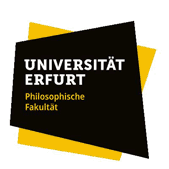

DEFA without borders: Mobility and Space
Organized by the Department of Media and Communication Studies at the University of Erfurt in cooperation with the DEFA Foundation, Berlin
Conference organization:
- University of Erfurt: Prof. Dr. Michael Grisko, Prof. Dr. Dr. Patrick Rössler
- DEFA-Stiftung: Stefanie Eckert und Linda Söffker
Conference venue: University of Erfurt
Conference date: 25 to 27 March 2026
Deadline for submissions: 31 August 2025

The conference theme DEFA without borders: Mobility and Space can be discussed in terms of content and institutions. Thus, contributions are welcome that deal with the content-related design of space and place, or that examine mobility – in the sense of travelling and movement in space – as a topic of cinematic exploration. On the other hand, the diverse transnational interdependencies of DEFA can be addressed, among other things with regard to the institutional framework conditions of film export and import.
This dual perspective is intended to broaden the view of the impact of DEFA film and embed it in a transnational context in order to strike a new path as well as continuing established research.
1. Mobility and space in film
Space and the mobility necessary for the experience of space open up a wide range of possible topics in the first section of the conference. On the one hand, the importance of real and fictitious film locations in the film production of the GDR will be discussed. These can be a wide variety of topographies, ranging from significant cities and their staging (e.g. Berlin, Leipzig, Rostock, Weimar) to natural phenomena (mountains, sea) to buildings, structures or streets (border wall, Halle-Neustadt, Berlin-Alexanderplatz, television tower, Prenzlauer Berg), including both aesthetic and content-related perspectives. In a broader view, the representation of socialist and non-socialist foreign countries are of interest; above all the Federal Republic of Germany, but also the USA and France, Poland, the Soviet Union, or former colonies that have become independent and their transformation, all with an emphasis on the respective socio-political context. Last but not least, the question of historical constellations and their localizations should be raised – from the Spanish Civil War to the revolution in Cuba and the Vietnam War.
Another central topic of the spatial experience are the forms of professional and leisure tourism and their reflection in the movies. What significance did the topic assume at different times, which places preferably found their way onto the screen, and what did it mean? This not only raises the question of genre conventions – between travel film and road movie – but also the question of mobility and its socio-political instrumentalization (car, plane, ship). Space resumes a particular quality in fantasy movies or utopian films which are welcome to be addressed. Last but not least, the same is true for dimensions of the own and the foreign in the national neighborhood, and thus the aspect of foreigners in the GDR and their cinematic representation.
2. Mobility and space of film
With its second part, the conference opens up a perspective on the structures of film production, film distribution and their transnational character. In doing so, it builds on previous conferences and publications, such as ‘DEFA international – Grenzüberschreitende Filmbeziehungen vor und nach dem Mauerbau’ (2011). A possible focus of interest could touch on the presence and significance of international festivals (in socialist and non-socialist countries), the distribution of films, both for import and export, and thus the question of dubbing vs. versions edited in different languages. It would also be conceivable to address the significance of film for transnational relations and interdependencies, for example as part of cultural policy or cultural exchange. Here, aesthetic and/or content-related correspondences between national cinemas could be examined, including the exchange of particular studio resources, actors, or other participants from the artistic-technical staff.
Moreover, scholars are encouraged to submit proposals on other topics and research questions that fit into this context of mobility and space or expand it.
The conference will take place at the University of Erfurt and will be held in German and English. Researchers from all disciplines who are interested in the topic are cordially invited to participate. We would particularly like to call on young academics to engage with the DEFA film heritage and to enrich our conference with their contributions to the discussion. We ask you to check whether the travel and accommodation costs can be covered by the your home institution; in individual cases, the conference organizers can be contacted for funding. The presentations will probably be recorded on video. It is planned to publish written essays based on the presentations shortly after the conference.
We kindly ask you to submit your proposal in the form of an abstract in brief (max. 300 words) in German or English by 31 August 2025 to Prof. Dr. Michael Grisko (e-mail: defa2026erfurt@gmx.de), please send biographical information about yourself in the same e-mail (max. 40 words). The program decision will be final by 31 October 2025.
